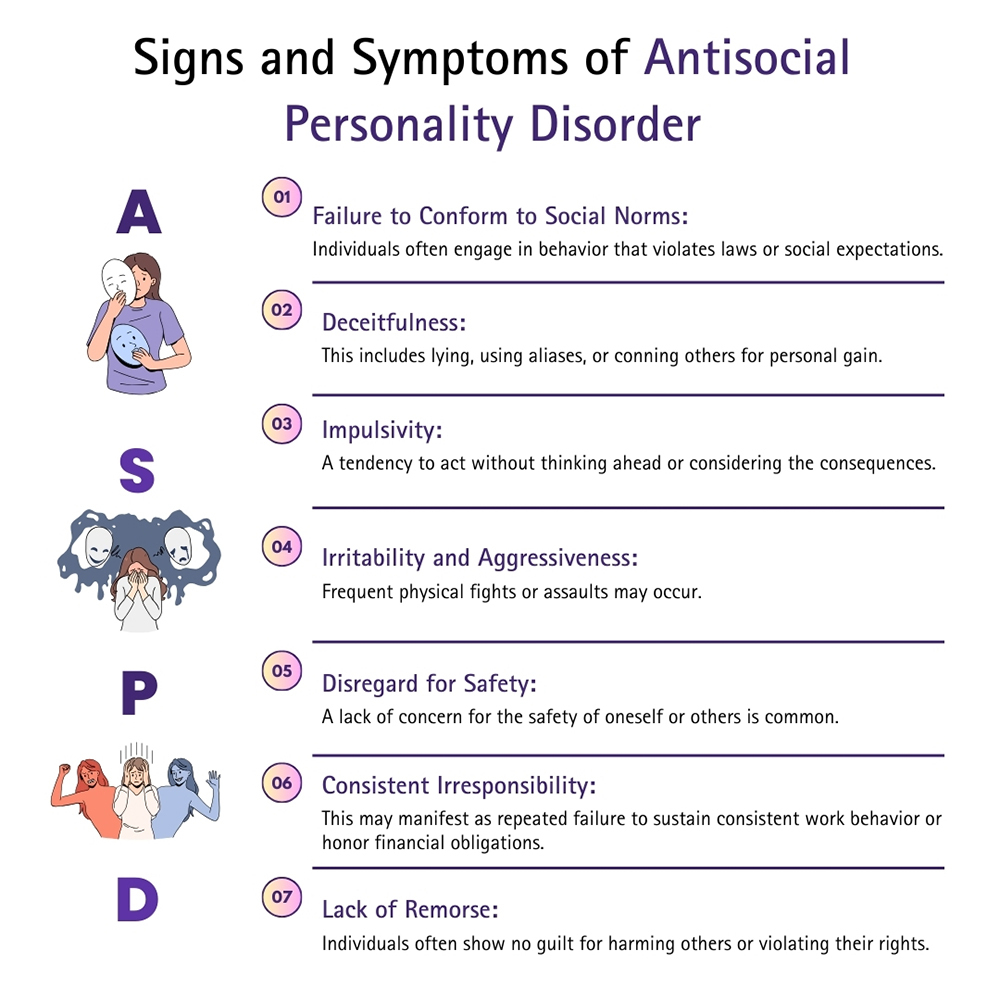What Is Antisocial Personality Disorder (ASPD)?

Antisocial personality disorder (ASPD) is characterized by a disregard for others and a violation of their rights. ASPD is what is often referred to as a psychopath or sociopath. People with antisocial personality disorder may be deceitful and manipulative. These behaviors have an onset in childhood and continue into adulthood. Individuals with ASPD may perform acts that are grounds for arrest, such as destroying property, harassing others, stealing, or pursuing illegal occupations. People with this diagnosis typically don’t care for the feelings, wishes, rights, or property of others.
What Causes Antisocial Personality Disorder (ASPD)?
People with a family history of ASPD are at a higher risk of developing the disorder.
Environmental factors may also affect ASPD, such as:
- Childhood abuse or neglect
- Unstable or violent family life
- Exposure to violence or crime
- Early exposure to drugs or alcohol
Not everyone with these risk factors will develop ASPD. The disorder is diagnosed in adulthood, but symptoms such as aggression, defiance, and rule-breaking may become prevalent in childhood.
Embrace Healing The Power of Trust in Therapeutic Relationships
“In my experience, the most effective aspect of therapy is the therapeutic relationship. Establishing trust between a client and clinician is the first step to healing.”
At What Age Does Antisocial Personality Disorder (ASPD) Develop?
ASPD begins to develop in childhood with symptoms appearing before age 15. However, a diagnosis of ASPD cannot be made until age 18. People with ASPD have difficulty developing relationships, are more likely to participate in criminal activity, and have an increased risk for substance use disorders and other mental health disorders.
What Are the Signs and Symptoms of Antisocial Personality Disorder (ASPD)?
Symptoms and signs of ASPD include:
- Failure to conform to social norms
- Deceitfulness
- Impulsivity or failure to plan ahead
- Irritability and aggressiveness
- Disregard for the safety of others
- Consistent irresponsibility
- Lack of remorse for hurting others
If you are concerned that you or someone you know may have ASPD, it is important to talk to a qualified therapist for an appropriate diagnosis.
How Is ASPD Diagnosed?
ASPD must be diagnosed by a mental health professional. The clinician will ask questions about symptoms, history, behaviors, and social functioning. The clinician may also talk to the family with the permission of the client to gather information. To be diagnosed with ASPD, the client must be at least 18 years old with symptom onset before the age of 15.
What Is the Best Treatment for Antisocial Personality Disorder (ASPD)?
The best treatment for ASPD is a combination of psychotherapy and medication.
Therapeutic interventions that are effective for ASPD include:
- Cognitive behavioral therapy (CBT): This therapy helps clients identify and change negative behaviors.
- Dialectical behavioral therapy (DBT): This type of therapy helps clients learn skills to tolerate distress.
- Mentalization-based therapy (MBT): This type of therapy helps individuals understand their own and other’s feelings and behaviors.
In conjunction with therapy, medications can be used to treat aggression, impulsivity, and mood swings associated with ASPD, however, medications alone cannot treat the condition.

Are There Preventive Treatment Options for ASPD?
While there is no specific way to prevent ASPD, some things can be done to help reduce the risk of the condition including:
- Early intervention of conduct disorders in children
- Addressing social factors such as exposure to violence and drugs
- Positive parenting such as providing discipline while showing love and affection
ASPD is a complex condition and utilizing these techniques does not guarantee prevention of ASPD.
What Doctors Treat ASPD?
Doctors who treat ASPD include psychologists and psychiatrists.
If you are interested in learning more about our treatment options for ASPD in West Palm Beach, please contact us today. We would love to discuss your needs and develop a treatment plan that is right for you.

